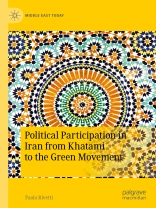This book examines the unintended consequences of top-down reforms in Iran, analysing how the Iranian reformist governments (1997–2005) sought to utilise gradual reforms to control independent activism, and how citizens responded to such a disciplinary action. While the governments successfully ‘set the field’ of permitted political participation, part of the civil society that took shape was unexpectedly independent. Despite being a minority, independent activists were not marginal: without them, in fact, the Green Movement of 2009 would not have taken shape. Building on in-depth empirical analysis, the author explains how autonomous activism forms and survives in a semi-authoritarian country. The book contributes to the debate about the implications of elite-led reforms for social reproduction, offering an innovative interpretation and an original analysis of social movements from a political science perspective.
قائمة المحتويات
Chapter 1. Introduction. Political participation and reformism in Iran.- Chapter 2. Locating Reform. The origin of reformism and situated research.- Chapter 3. Reformism as a state project.- Chapter 4. Reformism, Political Participation and Civil Society. Crafting consent and managing counter-power.- Chapter 5. Reformism, political participation and resistance.- Chapter 6. Conclusion. Lineages of change.
عن المؤلف
Paola Rivetti is Assistant Professor in Politics and International Relations in the School of Law and Government at Dublin City University, Ireland.












